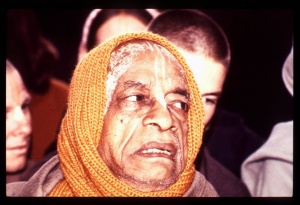CC Madhya 6.140: Difference between revisions
m (1 revision(s)) |
No edit summary |
||
| Line 1: | Line 1: | ||
{{ | [[Category:Sri Caitanya-caritamrta - Madhya-lila Chapter 06|C140]] | ||
<div style="float:left">'''[[Sri Caitanya-caritamrta|Śrī Caitanya-caritāmṛta]] - [[CC Madhya|Madhya-līlā]] - [[CC Madhya 6|Chapter 6: The Liberation of Sārvabhauma Bhaṭṭācārya]]'''</div> | |||
<div style="float:right">[[File:Go-previous.png|link=CC Madhya 6.139|Madhya-līlā 6.139]] '''[[CC Madhya 6.139|Madhya-līlā 6.139]] - [[CC Madhya 6.141|Madhya-līlā 6.141]]''' [[File:Go-next.png|link=CC Madhya 6.141|Madhya-līlā 6.141]]</div> | |||
{{CompareVersions|CC|Madhya 6.140|CC 1975|CC 1996}} | |||
{{RandomImage}} | |||
==== TEXT 140 ==== | ==== TEXT 140 ==== | ||
<div | <div class="verse"> | ||
sarvaiśvarya-paripūrṇa svayaṁ bhagavān | :sarvaiśvarya-paripūrṇa svayaṁ bhagavān | ||
tāṅre nirākāra kari’ karaha vyākhyāna | :tāṅre nirākāra kari’ karaha vyākhyāna | ||
</div> | </div> | ||
| Line 12: | Line 16: | ||
==== SYNONYMS ==== | ==== SYNONYMS ==== | ||
<div | <div class="synonyms"> | ||
sarva-aiśvarya- | ''sarva-aiśvarya-paripūrṇa''—full with all opulences; ''svayam''—personally; ''bhagavān''—the Supreme Personality of Godhead; ''tāṅre''—Him; ''nirākāra''—impersonal; ''kari’''—making; ''karaha''—you make; ''vyākhyāna''—explanation, | ||
</div> | </div> | ||
| Line 19: | Line 23: | ||
==== TRANSLATION ==== | ==== TRANSLATION ==== | ||
<div | <div class="translation"> | ||
“Actually, the Supreme Absolute Truth is a person, the Supreme Personality of Godhead, full with all opulences. You are trying to explain Him as impersonal and formless. | “Actually, the Supreme Absolute Truth is a person, the Supreme Personality of Godhead, full with all opulences. You are trying to explain Him as impersonal and formless. | ||
</div> | </div> | ||
| Line 26: | Line 30: | ||
==== PURPORT ==== | ==== PURPORT ==== | ||
<div | <div class="purport"> | ||
Brahman means bṛhattva, the greatest of all. The greatest of all is Śrī Kṛṣṇa, the Supreme Personality of Godhead. He possesses all potencies and opulence in full; therefore the Absolute Truth, the greatest of all, is the Supreme Personality of Godhead. Whether one says “Brahman” or “the Supreme Personality of Godhead,” the fact is the same, for they are identical. In the Bhagavad-gītā, Arjuna accepted Kṛṣṇa as paraṁ brahma paraṁ dhāma ([[BG 10.12]]). Although the living entities or material nature are sometimes described as Brahman, Parabrahman—the Supreme, the greatest of all Brahmans—is still Kṛṣṇa, the Supreme Personality of Godhead. He is full with all opulences, and as such He possesses all riches, all strength, all reputation, all knowledge, all beauty and all renunciation. He is eternally a person and eternally supreme. If one tries to explain the Supreme impersonally, one distorts the real meaning of Brahman. | Brahman means ''bṛhattva'', the greatest of all. The greatest of all is Śrī Kṛṣṇa, the Supreme Personality of Godhead. He possesses all potencies and opulence in full; therefore the Absolute Truth, the greatest of all, is the Supreme Personality of Godhead. Whether one says “Brahman” or “the Supreme Personality of Godhead,” the fact is the same, for they are identical. In the [[Bhagavad-gita As It Is (1972)|''Bhagavad-gītā'']], Arjuna accepted Kṛṣṇa as ''paraṁ brahma paraṁ dhāma'' ([[BG 10.12-13 (1972)|BG 10.12]]). Although the living entities or material nature are sometimes described as Brahman, Parabrahman—the Supreme, the greatest of all Brahmans—is still Kṛṣṇa, the Supreme Personality of Godhead. He is full with all opulences, and as such He possesses all riches, all strength, all reputation, all knowledge, all beauty and all renunciation. He is eternally a person and eternally supreme. If one tries to explain the Supreme impersonally, one distorts the real meaning of Brahman. | ||
</div> | </div> | ||
__NOTOC__ | |||
<div style="float:right; clear:both;">[[File:Go-previous.png|link=CC Madhya 6.139|Madhya-līlā 6.139]] '''[[CC Madhya 6.139|Madhya-līlā 6.139]] - [[CC Madhya 6.141|Madhya-līlā 6.141]]''' [[File:Go-next.png|link=CC Madhya 6.141|Madhya-līlā 6.141]]</div> | |||
__NOTOC__ | |||
__NOEDITSECTION__ | |||
Revision as of 10:06, 29 July 2021

A.C. Bhaktivedanta Swami Prabhupada
TEXT 140
- sarvaiśvarya-paripūrṇa svayaṁ bhagavān
- tāṅre nirākāra kari’ karaha vyākhyāna
SYNONYMS
sarva-aiśvarya-paripūrṇa—full with all opulences; svayam—personally; bhagavān—the Supreme Personality of Godhead; tāṅre—Him; nirākāra—impersonal; kari’—making; karaha—you make; vyākhyāna—explanation,
TRANSLATION
“Actually, the Supreme Absolute Truth is a person, the Supreme Personality of Godhead, full with all opulences. You are trying to explain Him as impersonal and formless.
PURPORT
Brahman means bṛhattva, the greatest of all. The greatest of all is Śrī Kṛṣṇa, the Supreme Personality of Godhead. He possesses all potencies and opulence in full; therefore the Absolute Truth, the greatest of all, is the Supreme Personality of Godhead. Whether one says “Brahman” or “the Supreme Personality of Godhead,” the fact is the same, for they are identical. In the Bhagavad-gītā, Arjuna accepted Kṛṣṇa as paraṁ brahma paraṁ dhāma (BG 10.12). Although the living entities or material nature are sometimes described as Brahman, Parabrahman—the Supreme, the greatest of all Brahmans—is still Kṛṣṇa, the Supreme Personality of Godhead. He is full with all opulences, and as such He possesses all riches, all strength, all reputation, all knowledge, all beauty and all renunciation. He is eternally a person and eternally supreme. If one tries to explain the Supreme impersonally, one distorts the real meaning of Brahman.